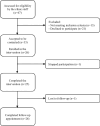A culturally and linguistically adapted text-message Diabetes Prevention Program for Latinos: Feasibility, acceptability, and preliminary effectiveness
- PMID: 37715986
- PMCID: PMC11491928
- DOI: 10.1093/tbm/ibad053
A culturally and linguistically adapted text-message Diabetes Prevention Program for Latinos: Feasibility, acceptability, and preliminary effectiveness
Abstract
Despite the general positive outcomes of the Diabetes Prevention Program (DPP), the program's reach, adherence, and effectiveness among Latinos are still suboptimal. Text-message DPP can potentially overcome barriers and improve DPP outcomes for this group. We aimed to assess the feasibility, acceptability, and preliminarily effectiveness of a culturally and linguistically adapted text-message DPP for Latinos. We enrolled 26 eligible Spanish-speaking Latino adults at risk of developing type 2 diabetes (A1c = 5.7%-6.4%, body mass index ≥25) in a 6-month culturally and linguistically adapted text-message DPP. Participants received (i) two to three daily automated text-messages about healthy eating, physical activity, problem-solving skills, lifestyle change motivation, and logistics, (ii) on-demand keyword-driven messages, and (iii) on-demand chat messages with a DPP coach. Outcomes included feasibility (e.g. adherence), acceptability (e.g. satisfaction), and preliminary effectiveness (e.g. weight loss). Twenty-four participants completed the program and follow-up assessments. Participants' mean body weight changed from 191.2 to 186.7 pounds (P = .004); 45.8% of participants lost ≥3%, and 29.2% lost ≥5% of body weight. Body mass index and waist circumference were also reduced [0.9 kg/m2 (P = .003) and 1.1 cm (P = .03), pre-post]. Self-reported physical activity frequency was increased (P = .003). No statistically significant changes in diet quality were found. Most participants were satisfied with the program and perceived it to help prevent diabetes. Our pilot study of an innovative text-message DPP for Latinos demonstrated the program was acceptable, feasible, and potentially effective. Using text-message for DPP can reduce barriers to in-person participation by increasing the program's reach without compromising fidelity and effectiveness.
Keywords: Diabetes Prevention Program (DPP); Latinos; Spanish DPP; pilot study; prediabetes; text message DPP.
Plain language summary
The Diabetes Prevention Program (DPP) is an in-person program that helps people to reduce their risk of having diabetes by supporting them to improve their lifestyles. However, the program is not working well for Latinos. It is possible that offering the program using text-messages for Latinos can support them in improving their lifestyles so they can reduce their chances of getting diabetes. We developed a text-message DPP for Latinos who speak Spanish to test if the program would work for them. A total of 26 Latinos received 2 to 3 daily text-messages about healthy eating, physical activity, and motivations to change lifestyles, for a period of 6 months. Participants also had the chance to send messages to coaches to get individualized responses. By the end of the 6 months, 24 Latinos completed the program. Participants reduced an average of 5.5 pounds in body weight. We also saw reductions in participants’ waist circumferences. In addition, participants started to do more physical activity. Most participants were satisfied with the program and perceived it helped them prevent diabetes. In conclusion, we believe that our program worked well and was successful in helping Latinos to change their lifestyles to prevent diabetes.
© Society of Behavioral Medicine 2023. All rights reserved. For permissions, please e-mail: journals.permissions@oup.com.
Conflict of interest statement
None to declare.
Figures
Similar articles
-
Advancing Type 2 Diabetes Prevention through Text-Messaging Interventions: A Narrative Review.Curr Diab Rep. 2024 Dec 4;25(1):9. doi: 10.1007/s11892-024-01568-w. Curr Diab Rep. 2024. PMID: 39630283 Free PMC article.
-
A Community Health Worker-driven and integrated interactive text messaging intervention to promote smoking cessation and lung cancer screening uptake rates among high-risk Asian immigrants: a feasibility pilot RCT study.Transl Behav Med. 2025 Jan 16;15(1):ibaf018. doi: 10.1093/tbm/ibaf018. Transl Behav Med. 2025. PMID: 40471875 Clinical Trial.
-
The feasibility, acceptability, and preliminary effectiveness of a Promotora-Led Diabetes Prevention Program (PL-DPP) in Latinas: a pilot study.Diabetes Educ. 2015 Aug;41(4):485-94. doi: 10.1177/0145721715586576. Epub 2015 May 28. Diabetes Educ. 2015. PMID: 26023095 Free PMC article.
-
Feasibility and Acceptability of a Culturally- and Linguistically-Adapted Smoking Cessation Text Messaging Intervention for Latino Smokers.Front Public Health. 2020 Jun 30;8:269. doi: 10.3389/fpubh.2020.00269. eCollection 2020. Front Public Health. 2020. PMID: 32714891 Free PMC article.
-
Comparing Two Programs for Weight Loss among Marshallese Adults Living in the United States [Internet].Washington (DC): Patient-Centered Outcomes Research Institute (PCORI); 2022 Mar. Washington (DC): Patient-Centered Outcomes Research Institute (PCORI); 2022 Mar. PMID: 39666844 Free Books & Documents. Review.
Cited by
-
Advancing Type 2 Diabetes Prevention through Text-Messaging Interventions: A Narrative Review.Curr Diab Rep. 2024 Dec 4;25(1):9. doi: 10.1007/s11892-024-01568-w. Curr Diab Rep. 2024. PMID: 39630283 Free PMC article.
-
Linking genetic counseling communication skills to patient outcomes and experiences using a community-engagement and provider-engagement approach: research protocol for the GC-PRO mixed methods sequential explanatory study.BMJ Open. 2024 Apr 17;14(4):e085472. doi: 10.1136/bmjopen-2024-085472. BMJ Open. 2024. PMID: 38631834 Free PMC article.
-
Leveraging Technology and Theory to Change Health Behaviors, Close Gaps in Health-Related Social Needs, and Increase Enrollment in the National Diabetes Prevention Program.Prev Chronic Dis. 2025 Mar 13;22:E10. doi: 10.5888/pcd22.240284. Prev Chronic Dis. 2025. PMID: 40080691 Free PMC article.
References
-
- Centers for Disease Control and Prevention (CDC). What Is Diabetes? https://www.cdc.gov/diabetes/basics/diabetes.html (27 July 2022, date last accessed).
MeSH terms
Grants and funding
LinkOut - more resources
Full Text Sources
Medical



